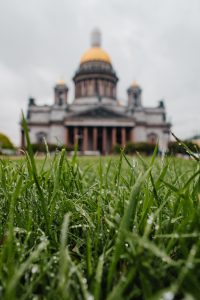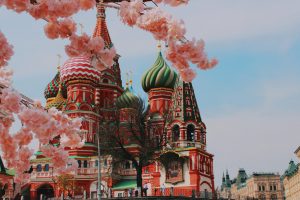Russia is home to dramatic natural beauty, magnificent cathedrals, delightfully tasty cuisine, a long history and compelling culture, not to mention a fascinating language! Despite being one of the largest countries in the world, Russian is only the eighth most spoken language in the world, however this doesn’t undermine its extreme importance globally. In this blog, we will reveal how the Russian language is vastly different to any other language and what makes it so appealing to learn.

Did you know that Russian…
… uses the Cyrillic alphabet.
Rather than using the Latin alphabet like most other European languages, Russian adopted the Cyrillic script instead, which originates from the First Bulgarian Empire in the 9th Century. With entirely unique characters, the Cyrillic alphabet consists of 33 letters; 10 vowels, 21 consonants, and 2 that have no sound at all! Unusually, the vowels are particularly unique as they each have 5 sounds and are written with different letters depending on whether they follow a hard consonant or a soft consonant. On top of that, the type of vowel always indicates whether the preceding consonant is hard or soft sounding.

… words hardly ever begin with the letter ‘A‘.
Native Russian words generally don’t begin with the letter ‘A‘. Why is this the case? When the Old Russian language evolved into Modern Russian, a number of drastic phonetic changes occurred, including words beginning with ‘A‘ being prefixed with the sound “й”. There are some notable exceptions, such as “азбука” (alphabet) and “авось“(perhaps), but these anomalies are far and few between. If you see a Russian word starting with ‘A‘, most likely it’s adopted from another language.

… does not use the verb ‘to be‘ in the present tense.
The verb ‘to be’ is only really used in the past or future tense and never in the present tense. Instead, an adjective, noun or another verb follows the subject. For example, you would never say ‘I am a student‘, but rather you would say ‘I student’ in Russian. Pretty simple isn’t it?

… is the official language of space (along with English).
While NASA is arguably the front-runner in the international space programme, don’t forget that Russia also is a key player and has made colossal excursions into space. As a result, all astronauts have to learn Russian as part of their training and the ISS (International Space Station) computer system uses both English and Russian. In fact, it’s remarkable to see how much Russian influenced English during the Space Race. For example, the suffix “-nik“, used in “sputnik” (fellow traveller), was actually borrowed from Russian.

… adjectives all have multiple syllables.
Like all languages, a great deal of Russian words consist of one syllable or even just one character. However, all Russian adjectives have two or more, but there is only one exception… “злой” (angry). Should be easy to remember, right?

Feel inspired to learn Russian? We have lots of online or face-to-face Russian classes starting in a few weeks! Find out more here.